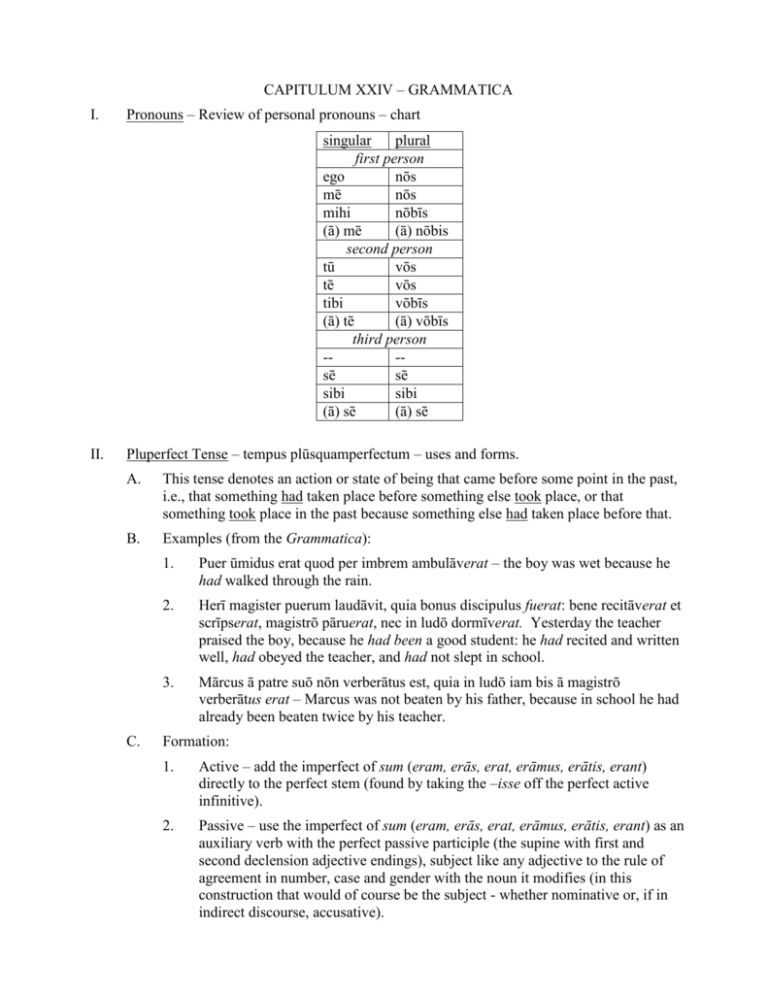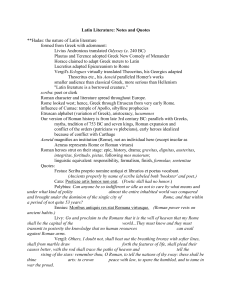CAPITULUM XXVII – GRAMMATICA
advertisement

CAPITULUM XXIV – GRAMMATICA I. Pronouns – Review of personal pronouns – chart singular plural first person ego nōs mē nōs mihi nōbīs (ā) mē (ā) nōbis second person tū vōs tē vōs tibi vōbīs (ā) tē (ā) vōbīs third person --sē sē sibi sibi (ā) sē (ā) sē II. Pluperfect Tense – tempus plūsquamperfectum – uses and forms. A. This tense denotes an action or state of being that came before some point in the past, i.e., that something had taken place before something else took place, or that something took place in the past because something else had taken place before that. B. Examples (from the Grammatica): C. 1. Puer ūmidus erat quod per imbrem ambulāverat – the boy was wet because he had walked through the rain. 2. Herī magister puerum laudāvit, quia bonus discipulus fuerat: bene recitāverat et scrīpserat, magistrō pāruerat, nec in ludō dormīverat. Yesterday the teacher praised the boy, because he had been a good student: he had recited and written well, had obeyed the teacher, and had not slept in school. 3. Mārcus ā patre suō nōn verberātus est, quia in ludō iam bis ā magistrō verberātus erat – Marcus was not beaten by his father, because in school he had already been beaten twice by his teacher. Formation: 1. Active – add the imperfect of sum (eram, erās, erat, erāmus, erātis, erant) directly to the perfect stem (found by taking the –isse off the perfect active infinitive). 2. Passive – use the imperfect of sum (eram, erās, erat, erāmus, erātis, erant) as an auxiliary verb with the perfect passive participle (the supine with first and second declension adjective endings), subject like any adjective to the rule of agreement in number, case and gender with the noun it modifies (in this construction that would of course be the subject - whether nominative or, if in indirect discourse, accusative). III. Deponent Verbs – participles; perfect tense; singular imperative A. This kind of verb is always passive in form, except for the present participle and the future participle. Those are formed regularly and have active meanings. B. E.g. present participles: conāns, conāntis = trying; patiēns, patientis = experiencing/suffering; future active participles: conātūrus = about to try; passūrus = about to suffer/experience C. As a corollary, you can note that the first periphrastic is available for deponent verbs, with the result that you could say conātūrus sum as an alternative to conābor, or passūrus est for patiētur. D. The perfect tense is formed with what would be the supine if deponents had them. E. IV. 1. This is just like the perfect passive of regular verbs, which uses the perfect participle with the forms sum, es, est, sumus, estis, & sunt as auxiliary verbs. Remember that it is the nature of deponent verbs not to have any active forms in the perfect tense. 2. E.g., Quīntus surgere conātur becomes in the perfect tense Quīntus surgere conātus est. Mārcus mentītur becomes Mārcus mentītus est. 3. Note that these are active in meaning. Though more fully treated in Chp. 25, we get in this chapter a brief introduction to the singular imperative of deponents. Quintus dīcit ad versum 40-1: Cōnsōlāre mē, Syra! Cōnsīde hīc iūxtā lectum et loquere mēcum! (Cheer me up, Syra! Sit here next to the bed and chat with me!) 1. An easy way to think of the singular imperative of deponents is to imagine they have a regular active infinitive. That is the imperative singular form. 2. If cōnsōlārī were the passive infinitive of a regular verb – instead of being a deponent – its infinitive would be cōnsōlāre. This was used as its imperative singular form. 3. Same thing with the third conjugation deponent verb loquī. Its imperative is loquere. 4. Again remember that these are active in meaning. Ablative of comparison A. Instead of using the adverbial conjunction quam, the second term of the comparison can simply be made in the ablative case. B. Examples: 1. Mārcus pigrior est quam Quīntus = Mārcus prigrior Quīntō est. 2. ...pēs dexter māior est pede laevō (line 30) = pēs dexter māior est quam pes laevus 3. ...is nōn pēior fuerat cēterīs (line 77) = is nōn pēior fuerat quam cēterī 4. Is canis lupō ferōcior est (line 90) = is canis est ferōcior quam lupus 5. Melior sum frātre meō (line 108) = melior sum quam frāter meus V. Miscellaneous A. nōscere = get to know/learn; therefore, its perfect tense [inf. = nōvisse] = know/be acquainted with 1. B. e.g. (lines 57-8) the question of Quintus: Quōmodō Mēdus puellam Rōmānam nōscere potuit? (How could Medus get to know a Roman girl?) can be answered by Syra: Nesciō quōmodō, sed certō sciō eum aliquam fēminam nōvisse. (I do not know how, but I know for sure that he is acquainted with some woman) Note we have a bunch of adverbs with the –ō ending in this chapter: prīmō (at first), certō (certainly), subitō (suddenly), dēnuō (again), continuō (right away, immediately)





